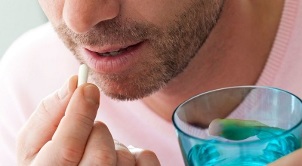
Antibiotics for prostatitis if the patient consults a urologist in the acute stage of inflammation are prescribed immediately. That is, doctors will not wait for test data. Therefore, in the early days, drugs with a broad spectrum of action were chosen, the selection scheme was very similar when choosing antibiotics for cystitis.
Once laboratory data is received by a physician, it usually takes two to three days, a decision is made either to continue the chosen therapeutic regimen or to prescribe a new, more effective medication.
When choosing a drug, the doctor must take into account the age of the patient, the presence of certain somatic diseases in his anamnesis, and allergic reactions.
On the other hand, the patient must warn the doctor about the antibiotics he or she has used.
If a man is treated with medication a few weeks before prostatitis, then most likely at this stage it is not as effective as needed to relieve inflammation.
Among the different groups of antibiotics, there are so-called "storage" drugs, which include drugs with strong effects on the body. Urologists prescribe them only if previous conservative treatment has not helped.
Antibiotic therapy requires certain conditions.
- Antibiotics are prescribed for a certain period of time. Usually at least 2 weeks. In the future, the doctor will assess the condition of the prostate gland and cancel the medication, or advise continued treatment;
- The dose of the drug is also chosen individually;
- The entire treatment must be completed. If disturbed, then the body will create suitable conditions for the transition of the acute infectious process into a chronic process;
- It should not be more than three days since you started using antibiotics until the pain and discomfort are reduced. If after this period the condition does not improve, then you need to see a doctor again for a review of therapy and selection of other antibiotics.
Antibiotic therapy is one of the most important conditions for complete recovery from bacterial prostatitis. A sick man must understand that his problem-free life in the future depends on adherence to the entire treatment regimen.
Antibiotics for prostatitis are selected from the following groups of drugs:
- Penicillin. This group has a wide range of effects on bacteria and therefore it is most often determined precisely before data are obtained from the laboratory. Another advantage of this drug is its estimated price and therefore each patient can receive treatment;
- Macrolidespenetrates the tissue of the prostate gland perfectly and begins to fight infection after the first intake. This group of drugs is practically non-toxic and does not affect the state of the intestinal microflora;
- Cephalosparins. They are used mainly in hospitals for being injected intramuscularly or intravenously;
- Tetrasiklin.Effective for prostatitis caused by chlamydia. But this drug is very toxic and has a spermatoxic effect. Therefore, before planning conception, they are not set;
- Fluoroquinolones.Used when there are no side effects from drugs from other groups.
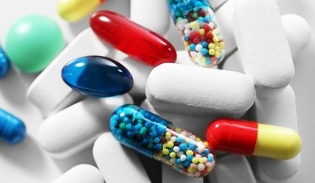
When using antibiotics for the first time, it is necessary to note all changes in the state of health. Often these medications cause severe allergic reactions, especially in patients with a history of allergies.
At home, prostatitis can not always be eliminated, because before giving any antibiotics, the doctor must check his reaction to the bacteria found.
Due to the large number of side effects, treatment should be carried out under expert supervision. If there are any unpleasant symptoms, you should immediately contact a doctor and change the medication.
Antibiotics for the treatment of prostatitis, available in pill form, may contain different active ingredients. Therefore, the list of medicines is quite extensive and only a doctor can prescribe the right medication.
Fluoroquinolones
The most effective antibiotics for prostatitis, according to urologists, belong to the group of fluoroquinolones. The benefits of fluoroquinolones in the treatment of prostate inflammation are:
- large distribution volume;
- creation of high concentrations of material in the prostate;
- penetrates cells;
- has a po-antibiotic effect - after taking the drug, concentrations that inhibit bacterial growth remain in the cell for several days;
- is most often taken once a day.
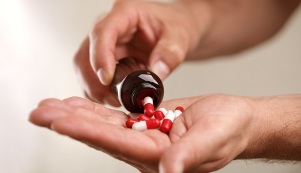
There are several generations of this type of antibacterial drug. The second, third and fourth generations are most often used in urological practice.
Antibiotics against prostatitis from the third generation, fluoroquinolones group, the fourth generation allows the treatment of inflammatory processes initiated by mixed microflora - facultative anaerobes, gram-positive, gram-negative bacteria (Escherichia coli, staphylococci, enterococci), atypical intracellular bacteria, mycoplas.
The active ingredients of fluoroquinolone preparation for prostatitis include: levofloxacin, ciprofloxacin, moxifloxacin.
Antibiotics for acute prostatitis in men can be used not for a month, but for two weeks, if the disease is initiated by the opportunistic flora.
As a rule, drugs in this group can be well tolerated by patients. The most common occurrences are nausea and diarrhea. Phototoxicity is rarely recorded.
If chronic bacterial prostatitis has started, different treatment strategies should be used.
Symptoms are not as noticeable as in the acute process. Patients complain of pain, urinary problems and sexual problems.
Chronic bacterial prostatitis is dangerous: for most men, it disappears almost invisible, accompanied by occasional pain, but causes infertility, problems with erections, prostate discharge and prostate adenoma.
All of this is revealed suddenly, when the obvious signs of this problem start to bother a man.
A man who is overwhelmed by unpleasant sensations and episodic pain, which becomes more frequent over time, turns to a urologist.
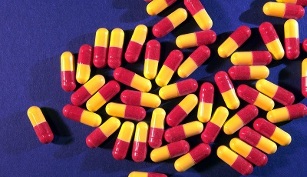
The doctor, as in acute prostatitis, performs the necessary examinations (blood tests, urine tests, palpation and bacterial culture), after which he develops a treatment regimen.
On average, treatment takes 4-8 weeks. This is a serious stress for the body, because in addition to the targeted microflora, our friends also suffer. Thus, antibiotic intake is associated with the intake of drugs that regenerate the gastrointestinal microflora.
In addition to antibiotics, patients are given physiotherapy treatments and medications that relieve edema and relax the smooth muscles of the prostate gland, one should not forget the folk remedies that accelerate the therapeutic effect in complex therapy.
Tetrasiklin
Also available in two forms of administration, they are very active against chlamydia and mycoplasm, therefore their effectiveness is higher in chronic prostatitis associated with sexually transmitted diseases. The optimal drug is the drug that has the best pharmacokinetic data and tolerance.
However, tetracycline has a detrimental effect on gram-positive flora, including being active in nosocomial infections with methicillin-resistant staphylococcus. These drugs destroy the forms of intracellular chlamydia, mycoplasma, ureaplasma. The advantage of tetracycline is the frequency of formation of lower intestinal dysbiosis, as well as the presence of anti-inflammatory effects. With regard to the intestine, Pseudomonas aeruginosa, they are ineffective.
For chlamydial infections, mycoplasm and ureaplasma, the drug is taken for 3 weeks, the rest of the pathogen takes two weeks.
Means from this group should not be taken with the simultaneous use of dairy products.
Macrolides in the treatment of prostatitis
Macrolides (including azalides) can only be used in certain conditions, as there is little scientific research confirming its effectiveness in prostatitis, and this group of antibiotics has little activity against gram-negative bacteria.
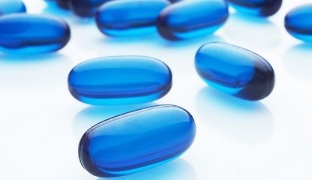
But you can not completely abandon the use of macrolides, as it is quite active against gram-positive bacteria and chlamydia.
Antibiotics from the macrolide group in the treatment of prostate inflammation have growth inhibiting effects on atypical intracellular bacteria, gram-positive microorganisms (cocci).
The advantage of macrolide in the treatment of prostate inflammation is its low toxicity compared to fluoroquinolones. Macrolides produce high concentrations of active ingredients in glandular tissue, have postantibiotic, anti-inflammatory and immunomodulatory effects. This drug has a beneficial effect on phagocytosis, inhibiting oxidative stress on cells. Macrolides can be used in adolescents.
If prostatitis is caused by an opportunistic flora, treatment may take two weeks. This medicine can be taken in combination with fluoroquinolones.
Many patients are interested in what antibiotics to take for prostatitis in men, if there is a history of penicillin allergy. Means from the macrolide group do not have cross-type allergies with drugs from the penicillin and cephalosporine groups, therefore it can be taken safely by allergy sufferers.
























